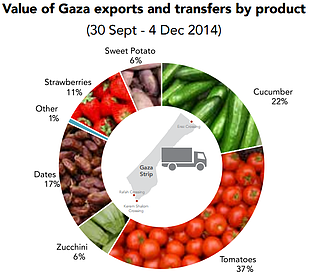Limited resumption of commercial transfers from Gaza to West Bank markets
Fewer than 150 trucks have left Gaza in 2014, compared to 9,300 in 2005
On 6 November 2014, the first transfer in 2014 of goods from Gaza to the West Bank took place when one truckload containing 10 tonnes of cucumbers exited to Hebron. By the end of November a total of 49 truckloads (approx. 420 tonnes) carrying a range of vegetables, strawberries, dates and fish were delivered to West Bank markets, generating an estimated income of approximately US$180,000 (excluding the fish).
 The exit of goods from Gaza to traditional markets in the West Bank and Israel came to a halt in the blockade imposed by Israeli from June 2007. The partial resumption of transfers to the West Bank this month represents part of the relaxation measures announced by Israel following the ceasefire ending the July-August war. The transfer of non-agricultural items to the West Bank, such as clothing and furniture, is also expected to resume in the coming month.
The exit of goods from Gaza to traditional markets in the West Bank and Israel came to a halt in the blockade imposed by Israeli from June 2007. The partial resumption of transfers to the West Bank this month represents part of the relaxation measures announced by Israel following the ceasefire ending the July-August war. The transfer of non-agricultural items to the West Bank, such as clothing and furniture, is also expected to resume in the coming month.
Palestinians have reported that the pace and volume of transfers has been hampered by lack of clarity regarding technical issues, including official information on Israeli requirements for the packaging of goods. According to local producers and exporters, proposals for amendments to the existing procedures to increase the volume of goods transferred have been rejected by the Israeli authorities, thereby jeopardizing the economic viability of these activities.
In 2005, more than 9,300 truckloads of goods exited Gaza, mostly destined for Israel and the West Bank, and nearly 6,000 in the first half of 2007 prior to the take-over by Hamas and the imposition of the blockade. Since 2010, Israel has allowed the exit of specified goods (mostly agricultural produce) only to overseas markets, where products produced in Gaza are largely non-competitive. To date in 2014, fewer than 150 trucks have left Gaza and exports ceased completely for five months between June and October.
The impact on the livelihoods of farmers and fishermen has been compounded by Israeli restrictions imposed on access to farming land along Gaza’s perimeter fence and to fishing waters along the coast on the grounds of security. Both sectors suffered extensive losses during the war in July and August.
The resumption of food exports and transfers on a significant scale would boost the private sector and increase the resilience of residents. The full lifting of the blockade would be an important step, alongside measures to ensure easier and more reliable access to external markets (see box on recommended steps).
Possible measures to facilitate exports and transfers
- Allow the resumption of exports to Israel;
- Re-open currently closed crossings for cargo activities;
- Relax restrictions on the entry of agricultural vehicles, equipment, fertilizer and pesticides;
- Allow the transfer of containers, making use of the Kerem Shalom scanner to address security concerns;
- Extend the opening hours and processing capacity of the Kerem Shalom crossing (e.g. after sunset operations using artificial lights);
- Increase the maximum height of cargo loads to international standards of 1.9 metres;
- Install shaded areas and reduce waiting times to limit the decay of perishable fresh agricultural produce;
- Lift the current requirement to wrap pallets of agricultural goods, which negatively impacts the quality of produce;
- Bring the dormant Palestinian-Israeli Coordination Committee for Agricultural Goods back into operation.
* FAO contributed to the drafting of this article









